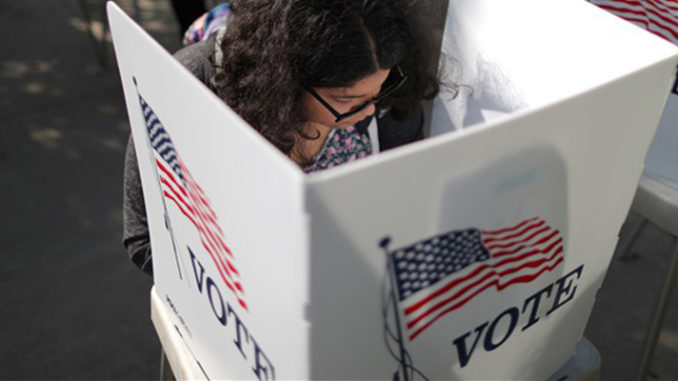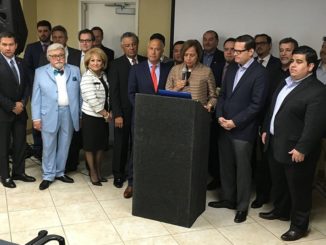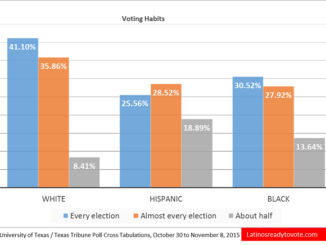
by Jennifer Rubin
Before 2018, it was conventional wisdom in polling and political circles that Hispanic voters were less likely to register and less likely to turn out to vote than white and African American voters. Something changed in 2018.
Reinforcing findings from a study from UCLA, Univision researchers found that, among Hispanic voters, there were “across the board voter registration and turnout increases in the key primary and general election states of Arizona, Colorado, Georgia, New Mexico, North Carolina, Ohio and Pennsylvania.” There were extremely significant, especially since this particular study did not include California, Florida and Texas, which were the subject of the UCLA study.
The numbers are quite remarkable, especially given this was not a presidential election. “In Arizona nearly 3 in 10 new registered voters were Hispanic. In Colorado 1 in 5 new registered voters were Hispanic. In New Mexico nearly half of all new registered voters were Hispanic. In North Carolina the number of Hispanic registered voters grew +28% while Non-Hispanics declined -4%.” (Emphasis in the original.)
The study also included these data points:
Hispanic voters delivered reliable and consequential increases in voter participation on average almost doubling turnout across these 7 key states
Independent/Other Hispanic voters were especially energized to go the polls, more than doubling turnout in these states on average
Growth in the number of Hispanic voters aged 18-24 tripled on average across AZ, CO, GA, NM, NC, OH, and PA.
Growth in the number of Hispanic voters aged 25-34 nearly doubled on average across these states.
Must-win Super Tuesday states Colorado and Georgia in addition to early state Ohio saw growth in Hispanic 18-24 voters more than triple and nearly double among the 25-34 demographic.
As one might expect, due to greater interest, registration and turnout among Hispanic voters, there was a 67 percent increase in ads targeting Hispanic voters.
Hispanic voters made up 11 percent of the electorate in 2018, about equal to the percentage of African American voters. In 2014, Hispanics made up 8 percent of the electorate. In 2018, Democrats captured 69 percent of the Hispanic vote (73 percent of Hispanic women), compared with 90 percent of blacks and 44 percent of whites.
A separate study from the Pew Research Center told us more about Hispanic voters: “About a quarter of Hispanics who cast a ballot in 2018 (27%) said they were voting in a midterm for the first time, compared with 18% of black voters and 12% of white voters, according to the exit polls. Meanwhile, many new voters this year were young. A majority of voters younger than 30 said they were voting in a midterm for the first time.”
In key Senate and House races, the winning Democrat got significant help from Hispanic voters. Take Nevada for example: “About 67% of Latinos voted for Democrat Jacky Rosen in the Senate race, compared with 30% who voted for Republican Dean Heller. In the race for governor, Latinos voted in a similar manner.”
While it is true that health care and the economy are important to Hispanics, just as they are to other groups, polling last year showed rising concern in the Trump era about their place in society. “Half of Latinos say their situation in the U.S. has worsened over the past year, up from 32% in the weeks after Donald Trump won the 2016 presidential election and the highest level since the Great Recession,” Pew reported. Immigration is certainly part of the reason. “In addition, more say they have serious concerns about their place in American society now (49%) than in 2017 (41%). And a majority (55%) say they are worried that they, a family member or close friend could be deported.”
In the Trump era, it is not simply immigration policy that troubles Hispanics — it is flat-out racism:
Nearly four-in-ten Hispanics say they have experienced at least one of four offensive incidents in the past year because of their Hispanic background, although about as many note that someone has expressed support for them because they are Hispanic. For the 38% of Hispanics who say they have experienced an incident, these comprise: experiencing discrimination or unfair treatment because of their Hispanic background, being criticized for speaking Spanish in public, being told to go back to their home country, or being called offensive names. Immigrant Hispanics are more likely than U.S.-born Hispanics to report they have experienced most of these incidents.
This is consistent with FBI data showing an uptick in hate crimes in the Trump era. (In California, for example, despite a slight decline in the overall number of hate crimes reported statewide, hate crimes against Hispanics increased 18 percent in 2018.)
Democrats would be wise to engage with Hispanic voters, particularly those who may have voted for the first time in 2018. While the overwhelming majority of Hispanics favor Democrats, President Trump, it seems, has increased their anxiety and prompted them to become more politically active. Democrats no doubt will reinforce the theme that Trump seeks to divide the country by race, marginalize non-whites and operate an inhumane immigration system. The evidence for this is and will continue to be plentiful.
Jennifer Rubin is an opinion writer covering politics and policy for the Washington Post



